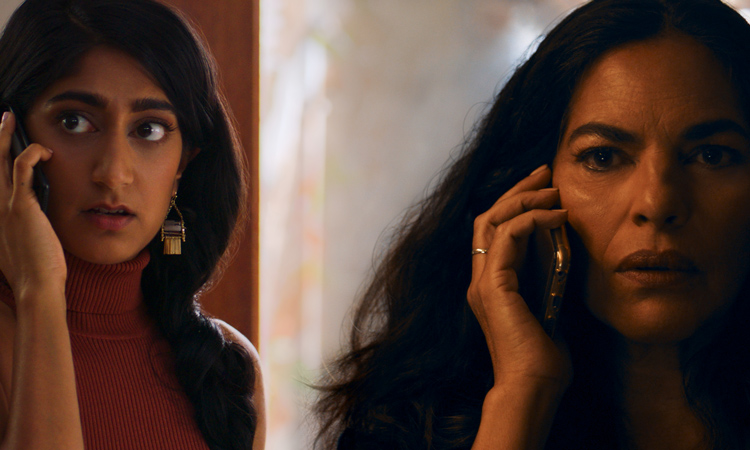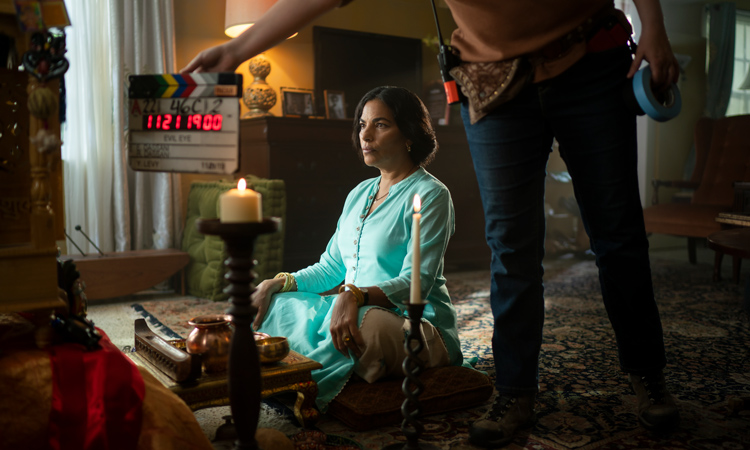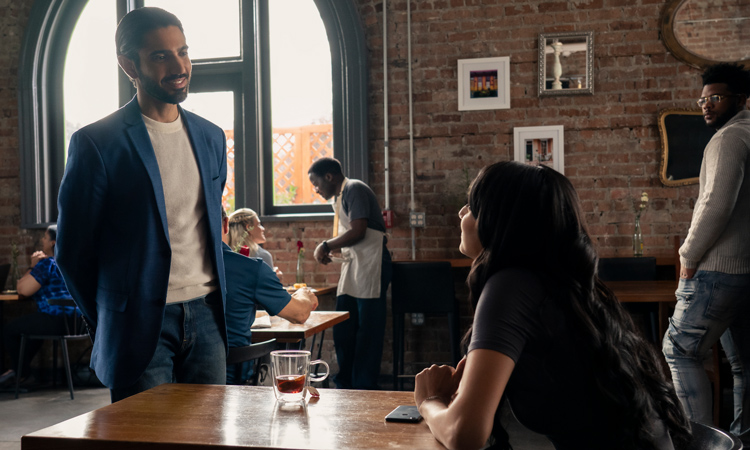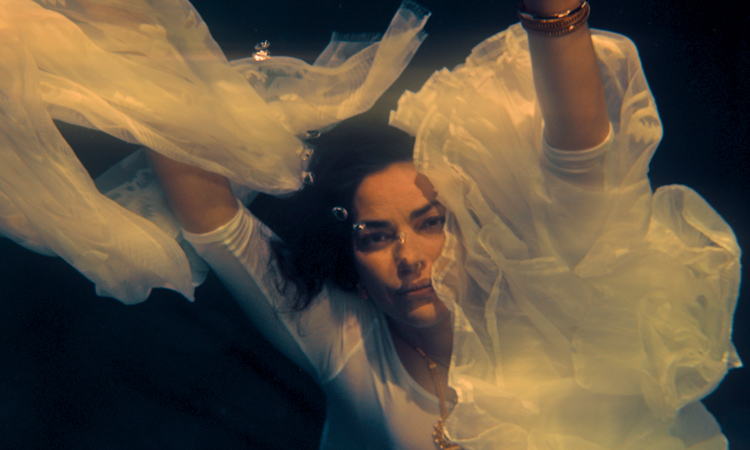“I was nervous that, you know, can we pull this off?” says actor Sunita Mani when we speak to her about her upcoming film Evil Eye. “It is a very particular Indian story, although it is quite relatable to a lot of South Asian and Eastern cultures. It was a tricky balance. I just wasn’t sure, honestly, if we could pull it off.”
Part of Welcome To The Blumhouse, Evil Eye follows Pallavi (Sunita Mani) and her mother Usha (Sarita Choudhury) as they navigate their relationship over thousands of miles (the former lives in New Orleans while the latter is in India). It’s a mixture of family drama and horror as Usha’s past comes back to haunt both mother and daughter. Having been the victim of domestic abuse as a young woman, Usha’s skeptical when Pallavi introduces her to her new, seemingly ‘perfect’ boyfriend, Sandeep (Omar Maskati). Despite actively encouraging her daughter to find a match, there’s something about Sandeep that she doesn’t trust – there’s something about the way he acts that feels dark and familiar…
“When I first read [the script] I was like ‘why did they send this to me? This is not my thing…’ and then as it went along I was like ‘oh!’” Sarita Choudhury tells us. “I just love that the story of [Usha’s] past and the abuse (which is in itself horrifying) was set under the umbrella of horror. I just love that. I was like ‘this is double horror!’”
This mixture of family drama and horror not only appealed to the cast, but it also called to the film’s co-directors (and twins) Elan and Rajeev Dassani. “We just found it to be such an amazing mix of very authentic complex drama and supernatural thriller,” says Elan. “It was a perfect combo!”
The other element to the script that especially appealed to the directors was its focus on Indian culture mixed with genre, something which stood out as unique: “[It] uses the Indian culture and its Indian mythology in this sort of thriller context that I hadn’t seen before,” says Rajeev. “We’re very familiar with Indian mothers who want their kids to get married, because obviously that’s our own history and so it was fun seeing that and then translating that into this whole dark back story!
“We wanted to begin almost as a family drama, so begin almost like a rom-com in some ways where you have the quote-unquote ‘overbearing mother’.” Rajeev continues. “You have the mother who wants her daughter to get married. The daughter who doesn’t want to be told what to do. I think what we wanted to feel is that initially, [the film] seems fun but then this sort of sense of anxiety and foreboding starts to permeate through as the mother gets more and more obsessed. We liked this idea that we, the audience, and the mother, both have this sense of something dark is coming, but we’re not really sure what it is…”
At the centre of this story is the relationship between Usha and Pallavi. Whereas many films may focus on the stereotypical overbearing mother and frustrated daughter, Evil Eye takes on a different note; showing the two women fully in their own right: “Usually the setup is that you only follow the daughter,” Sarita says. “The mother comes in and out as the nagging mother and you might find out something about her later, but they were equally shown, which I’ve never seen.”
With the vast geographical differences between Usha and Pallavi, this relationship is largely told over the phone as the two continuously FaceTime each other; an element to the filmmaking that threw up a few troubles for its actors: “It was not easy!” Sarita laughs. “Then I got so used to it and then I started to realise, ‘oh, you can do things when you’re on the phone that the person you’re talking to can’t see’. So that could be interesting. For an actor that’s fun because it plays with private and public. But at the beginning, it was tricky to get used to.”
“I kind of had to trick myself,” Sunita adds. “It was pretty bizarre. I would be like in this dramatic moment in a one sided monologue with myself imagining that Sarita was on the other line. But then I would pull out of that moment and see that there is a reader in the corner trying to hide herself off-frame! It was really bizarre to pull out from those moments. Not having a scene partner kind of allows for that so you’re like ‘oh my God, we’re making a movie where I’m just staring at a phone’ [haha].
“It was satisfying to see it cut together because it was shot so one sided. I did have some sense of Sarita’s scene based on footage I was able to see. Or just knowing who she is, we really bonded pretty early on in the filmmaking process, of just having that tone to carry and that someone to miss was informing a lot of me talking at myself.”

However tricky the phone scenes were to shoot, it clearly shows two characters’ dependence on each other, calling at all times of the day for advice, support or even just a general chat: “It’s easy to show co-dependence because, first of all, she calls her a lot and the daughter answers a lot!” Sarita laughs. “There’s this great moment where Sunita’s character says: “You know I spend so much time rebelling against my mother that I forgot what I really want to do”. She says something like that and I thought, ‘oh, that’s so interesting’. That is what co-dependence is and I love that because when the secret comes out and the past comes out, suddenly both of them are left with new lives.”
“I definitely relate to the mother-daughter relationship and the constant battle that they’re in,” Sunita tells us. “But I also see the dependence that they have on each other and I think that’s such a signifier of the kind of cultural divide and generational divide that is still relatable. I think it’s so important and quite realistic. The whole movie is about this relationship to me. That’s what drew me to the script and I loved having those long-distance phone calls, it felt a bit like a theatre piece or something when we were shooting it.”
Pallavi’s new relationship throws up a lot of painful memories for Usha, as we slowly find out throughout the film that she suffered from domestic abuse as a young woman and subsequent PTSD: “In the genre of horror or thriller or whatever it is, it was so beautiful to take such a real, deep subject and treat it delicately in this kind of other-fuelled situation that ends up being pretty violent,” Sarita explains. “I thought it was so clever and moving that they could do both. I think we were worried at times because we wanted to make sure you didn’t make that subject trivial on any aspect, so we really had to monitor it to make sure it was okay.”
“We actually spoke with experts who work with PTSD and work with domestic abuse to make sure that the portrayal of it was accurate,” Rajeev tells us. “To us, the film is ultimately about the cycle of violence. It’s about the way women are often abused but then return to their abusers or can’t escape from the trauma from it.”
“Also, we’ve all seen the [physical] stereotypical domestic violence being portrayed,” Elan adds. “But the reality is that there are a lot more microaggressions. There are a lot more things like ‘don’t see your friends’ or ‘you don’t need a job, just stay here’.”
“Isolating these kinds of psychological manipulations was a very interesting thing to portray,” Rajeev continues. “Sandeep in this film seems like a great guy, but if you pay attention, you’ll see him doing these things. You’ll see him isolating her. You’ll see him paying for her, so making her dependent on him. These things seem good but in reality they are tools used by abusive men.”
For her part, Usha turns to the ‘Evil Eye’ mythology to cope with the demons of her past and deal with its traumatic aftereffects: “I think often when people go through trauma and aren’t able to go to therapy and deal with it or share it, they pick solutions that work for them,” says Sarita. “To protect her daughter, a common device in a country like India, is to go to astrology, mythology, the gods. But it becomes almost like such an obsession in controlling her daughter that it loses the reason. It overtakes her.”

The unique combination of this genre element with South Asian culture was not lost on the cast: “It’s South Asian – a South Asian family in a horror genre. That was new!” laughs Sarita. “It’s hard to say, but when I saw it I remember just thinking: ‘Oh, there’s this unexpected deep understanding of another culture that is our culture.’ It raises a border because you watch the film and it’s all South Asian. We’re cooking South Asian food. We’re at altars. We’ve got these mythological objects and yet the story is very familiar. I think the universality of it is going to really appeal to people because I don’t think they’re going to expect that when they’re watching it.”
“I have never been presented with this opportunity to play an Indian American character so close to my own experience,” Sunita adds. “[Pallavi’s] own sense of American identity and independence and ideas about dating and success, alongside the more culturally traditional perspective. But it was a central story in this movie and we were very careful to treat that as normal. It’s something we all have experience with – the directors, the rest of the cast – so it is enmeshed in our day-to-day.”
Though primarily shot in New Orleans, the film switches between the US and India as Usha and Pallavi start to gain new understandings of each other, and though the two countries are thousands of miles away, the directors wanted to make sure audiences can see the close connection between the two characters.
“[We want audiences to see] India as this place where people are just like us, where people have problems,” Elan says. “Technology has allowed us to communicate over these huge distances, but that doesn’t change the fact that we’re still connected. Even 4000 miles away you still have mothers and daughters who can connect to each other, who can talk to each other and be concerned about each other. The emotional issues that they have can still stretch across those huge boundaries.”
“This is a story about the day today, it’s not exaggerated,” Sunita continues. “We’re not spelling it out, we’re just immersing you into it and treating it as part of the experience instead of a gimmick. That’s just something I’m protective of because I hadn’t really encountered it before. Sarita [Choudhury] was the first person I knew was cast in the movie and that really set the level of humanity and intrigue for me. I was like ‘oh, I definitely want to work on this film, and she’s been cast as the mother, how amazing!’”
It may seem a little odd to cast Sarita Choudhury as a stereotypical overbearing mother but as we’re sure you’ve realised by now, not everything in Evil Eye is as it seems, and this is certainly true in its portrayal of its two female protagonists: “When I first read it, I was a little scared,” says Sarita. “I was like ‘I do not want to play an overbearing mother. I haven’t done it. I don’t know how to do it’ and then as I followed this story. I was just thinking of all my relatives, my aunties, and thinking ‘what if they had a story that was never told and they were trapped in a cultural position?’ I just felt like this really deep feeling of ‘I need to do this’.”
Indeed, we soon find out that Usha is a force to be reckoned with, not just as a potential mother in law, but someone who has overcome tremendous hardship. “We love the fact that the main character is this Indian matriarch who usually is sort of stereotypical but in this case has a rich and layered back story,” Rajeev says.
“Usually in films you have a main character who is an Indian matriarch who wants her daughter to get married and they rarely get front billing. You rarely see the fact that they have their own life,” says Elan.
The apple doesn’t fall far from the tree and Pallavi certainly takes after her strong mother, forging a successful career in New Orleans. So when she falls under Sandeep’s spell, it takes her by surprise: “She’s totally independent and carving out her own place in this world [but then] she’s really drawn to something that she never saw for herself,” Sunita says. “It’s not really part of her plan. It’s part of her mother’s plan, something she has spent a long time resisting. But I think the immediate validation that she senses and gets from Sandeep – to have that common, shared background. Like Indian American kids and knowing what it’s like to be like pressured into arranged marriages. It’s the deep sense of validation and understanding that I think she didn’t even know she needed and she gets that [with Sandeep] which pushes away other intuitions. I think that it’s likely the comfort, that validation, that she’s not getting from her mother she’s sort of getting from Sandeep.”

With a boiling pot of genres to contend with, Elan and Rajeev focused on the film’s visuals to put across its main themes – the two have largely worked in special effects (including on big budget TV shows like Scandal, Covert Affairs and How To Get Away With Murder) so this was a natural path for them to take. “We wanted to make sure to demonstrate everything that was going on through visuals,” Elan says. “How do we show you where these people’s heads are at? How do we show this descent into obsession in terms of the visuals?”
Indeed, with themes such as psychological and physical domestic, there are some scenes in Evil Eye that were paramount for the directors to effectively get across.
“Bringing that that cinematic psychological sense was really important,” Rajeev adds. “Like the water sequence, for example, was not really a part of the original script. We felt like we needed and wanted something very dramatic and very intense to put the audience in the minds of our characters and that felt like a really interesting, evocative, visual way to cinematically give that sense.”

Putting their skills as visual effects artists into good use and creating an immersive, effective family horror, Elan and Rajeev have certainly succeeded in making the leap into directing. But what was it like working with your twin as a co-director?
“It’s funny you ask that because I think our like first… not fight… but first we needed to figure out who says ‘action’,” Rajeev laughs. “So we initially every take we would swap…”
“…and that worked terribly!” Elan laughs.
“Disastrously!” Rajeev agrees. “So we ended up [saying] ‘okay, you’ll do the morning scene. I’ll do the afternoon scene’ [haha]. But on a more serious note, I think what we found is that our tastes are very similar, though not always aligned and so what was actually really nice was that even when we disagreed, we would talk together and work it out. In that sense we actually make each others work better by kind of testing everything a little bit against each other to make sure it really works and tells a story which is great.”
There’s obviously a real family element behind the camera and on-screen for Evil Eye, and the directors hope that the message audiences take away from the film is to look a bit deeper into your own family. “[People may say] ‘there’s no way these guys cast Surita Choudhury as your typical mum’,” Rajeev says. “Who would do that? Then you find out [Usha] has this amazing background and you start to think ‘wait, do all the women in my life have fascinating backgrounds?’ Of course they do. We’d like to see if audiences ask the question: ‘Who else in your life is more interesting than you realise?”
“And if you ask our mum [what the message is], she would say: ‘Listen to your mum!’” laughs Elan.
“Exactly!” Rajeev agrees. “That’s her message.”
Evil Eye is available on Amazon Prime Video now.
